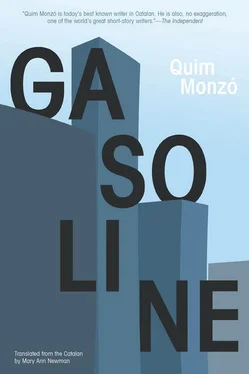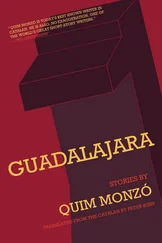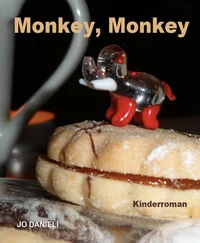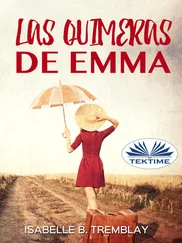Quim Monzó - Gasoline
Здесь есть возможность читать онлайн «Quim Monzó - Gasoline» весь текст электронной книги совершенно бесплатно (целиком полную версию без сокращений). В некоторых случаях можно слушать аудио, скачать через торрент в формате fb2 и присутствует краткое содержание. Год выпуска: 2010, Издательство: Open Letter, Жанр: Старинная литература, на английском языке. Описание произведения, (предисловие) а так же отзывы посетителей доступны на портале библиотеки ЛибКат.
- Название:Gasoline
- Автор:
- Издательство:Open Letter
- Жанр:
- Год:2010
- ISBN:нет данных
- Рейтинг книги:5 / 5. Голосов: 1
-
Избранное:Добавить в избранное
- Отзывы:
-
Ваша оценка:
- 100
- 1
- 2
- 3
- 4
- 5
Gasoline: краткое содержание, описание и аннотация
Предлагаем к чтению аннотацию, описание, краткое содержание или предисловие (зависит от того, что написал сам автор книги «Gasoline»). Если вы не нашли необходимую информацию о книге — напишите в комментариях, мы постараемся отыскать её.
Gasoline — читать онлайн бесплатно полную книгу (весь текст) целиком
Ниже представлен текст книги, разбитый по страницам. Система сохранения места последней прочитанной страницы, позволяет с удобством читать онлайн бесплатно книгу «Gasoline», без необходимости каждый раз заново искать на чём Вы остановились. Поставьте закладку, и сможете в любой момент перейти на страницу, на которой закончили чтение.
Интервал:
Закладка:
December
“Where to, kid?”
“Where?”
“Yes, where. What else?”
“Oh, I thought you meant it figuratively.”
— Francesc Trabal, L’any que veHe is dreaming of a swimming pool like the one he is sitting beside: white, spotless, blurred as if drawn in pencil and watercolors; or like a Hockney: lots of colorful awnings and tables with tall glasses. A woman with dark glasses is lying in a white hammock, sunbathing. It’s Helena. When she realizes he’s watching her, she smiles, raises her sunglasses until they are resting on the top of her head, looks back at him, and opens her mouth as if she were speaking, without emitting any sound. And, even though her voice can’t be heard, she is saying: “I’m upset you don’t want to make love with me.” “Make love!” Humbert snorts, and dives into the pool, where everything is warm and light blue, and he can swim for ages and ages underwater without having to come up to the surface for air. It was so easy to breathe underwater. . You just had to open your mouth like a fish out of water, but unlike a suffocating fish (for whom air is a foreign medium), he can breathe perfectly. “What a shame,” he thinks, “that this pool is only a drawing, so the sounds from above can’t reach me. Though sound wouldn’t reach me in a real pool, either.” When his head comes to the surface, Helena, who is sitting on the edge of the pool and splashing her feet in the water, is looking at him from behind her dark glasses, set against a desert background filled with singing Berbers. She has a straw sun hat on. “Do you love me?” she asks. In response, Humbert simply bites her foot, and everything goes into slow motion. Helena says, “Sometimes I think you’ve never loved me, and I mean nothing more to you than that diving board.” “What a great image,” Humbert thinks, “the diving board. As if it had all these different registers and levels of meaning. .” He hears someone laugh. He looks at the diving board, but the sun hurts his eyes, and he is now back in the water, his lungs full of air. He contemplates the bubbles that come out of his mouth. He thinks, “When I get out now, there’ll be a beer by the side of the pool.” When he gets out, a smiling Helena hands him an icy mug of beer with a snow-white head which drips and falls into the water, leaving patches of color that shouldn’t. . As he drinks the mug down, Helena kisses him on the forehead. “If only it could always be like this. .” He plunges back into the water and thinks, “When I get out, I want this house surrounding us, the house I live in, to be gone. I want to be on a beach.” He gets out and opens his eyes: he is on a beach. Wincing at the sunlight, he goes under again. “When I get out, I want to see the signature of the Hockney I’m in, in a corner somewhere.” When he gets out, in a corner of the sky (a cardboard sky right over his head) he sees Hockney’s signature, fading away as if written in smoke. Every time he gets out the sun pierces his eyes. If only he could always live under water. . “I could live there forever if it weren’t for the fact that every time I come up the sunlight hurts my eyes, and the longer and longer I stay under, and the longer and longer I take to come out again, the more it will hurt, until the times comes when I will bleed like a Christ figure, like a menstruating woman, like a wounded soldier, like a fish in a basket. .” A man jumps out a window and falls onto a tumbling mat. He runs down the street. Death is so sad. If he could only hide in a shadow. . To hide in a shadow is like not being there at all; he can only be touched or nabbed if he is in the sun, but then he has to stop, surrounded by the sands of a desert in the center of the world, under a red sun wearing dark glasses with frames the color of the girls riding down the highway on bicycles, on their way home, never arriving because they get lost on dirt trails, beyond the fences, rolling up the mountainside, those girls in the pictures of Helena as a teenager, sitting in meadows, wearing short skirts and high-heeled shoes, always smiling, wearing short pants and socks, with those flaming lips that scorch you as you die with pleasure.
•
Humbert wakes up when the rays of sunlight hit his face with such intensity that it hurts. He opens his eyes, looks at his watch (1:30), and jumps out of the lawn chair. He does some push-ups. He thinks, “I wouldn’t mind having an orange juice now.” He leans on the porch rail and looks toward the pool. “I would love to paint a pool. If only it hadn’t been done so often. .” He puts on shorts and thin-soled shoes. He goes toward the kitchen. He peels an orange. He eats it. He takes out four more, turns on the squeezer, and prepares himself an orange juice.
In the bungalow where he has his studio, he sits down at the table. Against the long wall rests a row of eight half-painted canvases. He gathers up the newspaper clippings, organizes them, and he reads snatches from them as he files them in different folders. The Times says, “Rarely in the history of contemporary art has there been a more meteoric rise than that of Humbert Herrera. We have certainly become accustomed, of late, to more or less rapid ascensions — a case in point being that of Heribert Julià, whose unfortunate accident is responsible for our making the acquaintance of Herrera, who, as Julià’s replacement, has produced his first, and definitive, exhibition. .” La Reppublica says: “With the exception of Miró, the most renowned Catalan artist to precede Julià and Herrera, perhaps not since Picasso’s death has an artist so exclusively captured the attention. .” Another, from O Globo : “After two solid decades of artistic disarray, of wave upon wave of pictorial fads, each superimposed one upon the other, finally one young man — and his youth must be stressed, for it holds out great hope for the art world — seems at last to have taken up the challenge of art as a totality, and has responded with a cohesive body of work which — though written off as a hodge-podge by envious pens — manages to make eclectic and unselfconscious use of elements taken from all the artistic trends of these years of confusion, from conceptualism to the new expressionism, to build an articulated body of work — perhaps the most coherent oeuvre of the post-modern aesthetic. Herrera plays all the chords of human sentiment and ratiocination, from tenderness to irony, to cynicism, thus taking up where the extraordinary momentum of Heribert Julià’s appearance little more than a year ago left off. Needless to say, the art world hopes that this new direction will be consolidated and not turn out to be, as has occurred on so many recent occasions, a mere promise, frustrated in the end. .”
He looks through his mail. A postcard from Tokyo: “Even before opening, almost everything is already sold. Ciao, Xano.” A package: the finished catalog for the Milan exhibition. He closes his eyes to daydream. He’d like to celebrate the opening of the exhibition by turning off all the lights in Milan for one night; the only lights on would be those of the gallery. On a white sheet of paper filled with notes he writes: “Speak with Milan City Hall.” And when they ask why? Humbert observes that the lack of a theoretical framework, common to all the latest generation of painters, while handy on occasions, is problematic at other times. He takes a notebook from the desk drawer and writes: “Smooth out the rough edges of the theoretical framework, particularly with regard to alterations in the routines of big cities.” Another postcard from Xano, dated two days after the previous one: “Paintings not sold before opening are now sold. Keep up the good work! Big hug, Xano.” A letter from an Australian museum requesting more paintings. He thinks: “Odd that I don’t have any in New Zealand yet.” On the sheet full of notes he writes: “Find out what’s going on with New Zealand.” He takes another notebook out of the drawer with the word paintings on the cover and jots down: “Do a totally disconcerting and false landscape and title it New Zealand .”
Читать дальшеИнтервал:
Закладка:
Похожие книги на «Gasoline»
Представляем Вашему вниманию похожие книги на «Gasoline» списком для выбора. Мы отобрали схожую по названию и смыслу литературу в надежде предоставить читателям больше вариантов отыскать новые, интересные, ещё непрочитанные произведения.
Обсуждение, отзывы о книге «Gasoline» и просто собственные мнения читателей. Оставьте ваши комментарии, напишите, что Вы думаете о произведении, его смысле или главных героях. Укажите что конкретно понравилось, а что нет, и почему Вы так считаете.












